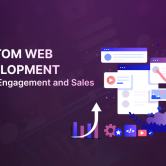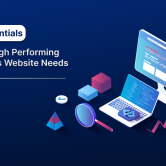
Best UI Design Trends Inspired by Popular Brands
UI design evolves constantly, and some of the most impactful trends today are inspired by how leading brands refine their digital experiences. From Spotify’s sleek dark mode to Apple’s minimalist design, these approaches show how great interfaces can blend aesthetics with usability. Let’s look at eight key UI design trends shaping the way we interact with products.
1. Dark Mode with Vibrant Accents
What started as a developer preference is now a mainstream design choice. Brands like Spotify and Twitter (X) made dark backgrounds popular by using bold color highlights to keep content engaging. The trick lies in balancing contrast, ensuring readability, and using accent tones to guide attention.
2. Data-Friendly Dashboards
Complex data can overwhelm users, but companies like Slack and Notion have transformed dashboards into clean, digestible experiences. Card-based layouts, progressive disclosure, and mobile-first thinking help users make sense of numbers without feeling lost.
3. Minimalist Interfaces
Minimalism doesn’t mean “less design” it means purposeful design. Apple continues to set the gold standard with clean visuals, calculated whitespace, and focus on the product. Many eCommerce and SaaS platforms now embrace this style to make offerings stand out without clutter.
4. Micro-Interactions & Animations
Small, delightful touches can turn mundane tasks into engaging ones. Instagram’s pull-to-refresh animation is a classic example. These subtle effects provide feedback, improve navigation, and make apps feel intuitive without distracting users from the main task.
5. Neumorphic Design Elements
Blending flat and skeuomorphic styles, neumorphism gives digital elements a tactile feel. Tesla’s in car interfaces showcase this perfectly with soft shadows and depth that mimic real-world buttons, making interactions feel natural.
6. AI-Integrated UI
With AI shaping user experiences, brands are focusing on simple, natural integration. ChatGPT’s interface feels like chatting with a friend instead of navigating a complicated system. Good AI-driven design ensures features feel like helpful extensions, not overwhelming add-ons.
7. Responsive & Adaptive Experiences
Different devices demand different experiences. Netflix masters this by tailoring interfaces desktop for browsing, mobile for quick access, and TV for lean-back viewing. Today, adaptive layouts ensure consistency while respecting user context.
8. Emotion Centric Design
Beyond functionality, brands now design for emotion. Headspace uses soothing visuals to create calmness, while Duolingo’s mascot motivates with playful cues. Designing with empathy makes products more relatable and keeps users engaged.
Conclusion
The most successful UI trends are not just about aesthetics they solve real user problems. Popular brands show us that great design is human-centered, emotionally intelligent, and adaptable. Companies providing web design services in USA are increasingly adopting these trends to deliver interfaces that delight users while meeting practical business needs.




